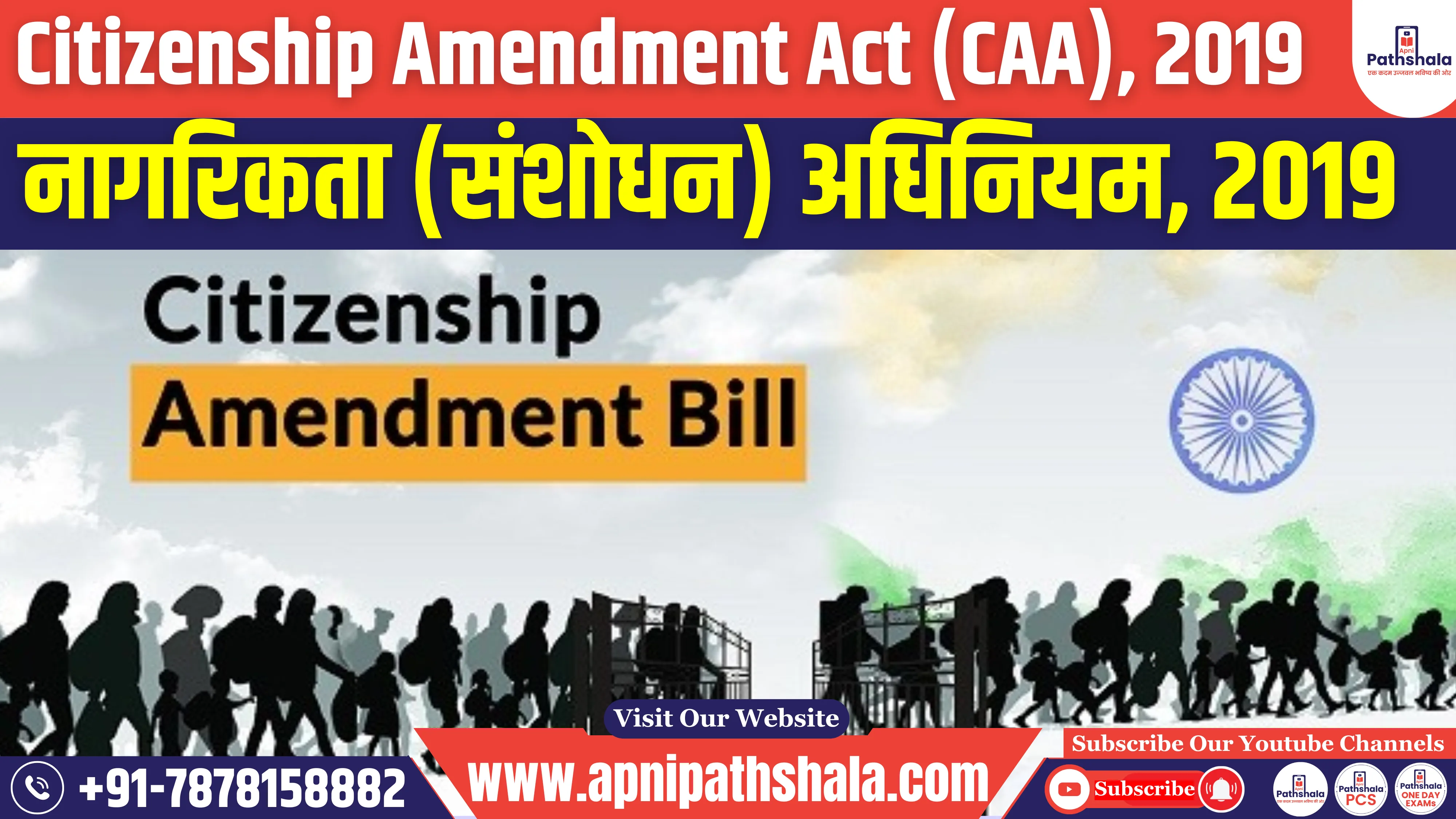
What’s in this Article?
- Table of Contents
- Why in the News?
- What is Citizenship?
- Who is an illegal migrant in India?
- About Citizenship Amendment Act (1955, 2019).
- National Register of Citizens (NRC)
- CAA 2024 Rules: Citizenship Amendment Rules
- The Nehru-Liaquat Pact
- Conclusion
- FAQs
- MCQs
Why in the News?
- The government on Monday (11 March, 2024) implemented the Citizenship (Amendment) Act, 2019, notifying the rules to fast-track citizenship for undocumented non-Muslim migrants from Pakistan, Bangladesh and Afghanistan who came to India before December 31, 2014.
- Applicants for Indian citizenship under the Citizenship (Amendment) Act 2019 (CAA) can submit any of nine documents, including valid or expired passport, ID cards and land tenancy records, to prove he or she is a national of Afghanistan or Bangladesh or Pakistan.
- The applicants can also submit any of 20 documents like copy of visa and immigration stamp on arrival in India, certificate issued by an elected member of any rural or urban body or a revenue officer to prove that he or she has entered India on or before December 31, 2014, according to the rules of the CAA issued on 11 March, 2024.
- The rules also state that the applicants will have to provide an eligibility certificate issued by a locally reputed community institution confirming that he or she belongs to either Hindu, Sikh, Buddhist, Jain, Parsi or Christian community and continues to be a member of that community.
- The government on 11 March, 2024 implemented the Citizenship (Amendment) Act, 2019, notifying the rules to fast-track citizenship for undocumented non-Muslim migrants from Pakistan, Bangladesh and Afghanistan who came to India before December 31, 2014.
What is Citizenship?
- Citizenship delineates the connection between a country and its populace, granting individuals various entitlements including state protection, voting privileges, and eligibility for specific public positions. In exchange, citizens are expected to fulfill certain responsibilities and obligations towards the state.
Citizenship in India
- Citizenship in India is governed by the Constitution, which establishes a unified citizenship throughout the country. The authority to regulate citizenship rights is vested in Parliament as per Article 11 of the Indian Constitution. The Citizenship Act of 1955 was enacted by Parliament to delineate the procedures for acquiring and confirming Indian citizenship.
- The Seventh Schedule, specifically Entry 17, grants exclusive legislative power to Parliament over matters concerning citizenship, including naturalization and the status of aliens. Prior to 1987, birth within Indian territory was sufficient to qualify for Indian citizenship.
- However, in response to concerns over alleged illegal migration from Bangladesh, amendments were made to the citizenship laws. These amendments stipulated that at least one parent must be Indian for eligibility for citizenship.
- Subsequent modifications in 2004 further refined the law, requiring not only that one parent be Indian but also that the other parent should not be an illegal immigrant.
Who is an illegal migrant in India?
- According to the legislation, an illegal migrant is defined as a non-citizen who:
- Arrives in the country without proper travel authorization such as a passport and visa,
- Enters with valid documentation but overstays beyond the authorized duration.
- Under the Foreigners Act of 1946 and the Passport (Entry into India) Act of 1920, illegal migrants may face imprisonment or deportation.
About Citizenship Amendment Act (1955, 2019)
- The Citizenship Act of 1955 outlines the procedures for obtaining and confirming Indian citizenship.
Regarding citizenship:
- Individuals born in India between January 26, 1950, and July 1, 1987, are considered Indian citizens by birth.
- Those born after July 1, 1987, but before the commencement of the Citizenship (Amendment) Act, 2003, with at least one parent being an Indian citizen at the time of their birth, are recognized as Indian citizens.
- Individuals born after the enactment of the Citizenship (Amendment) Act, 2003, with both parents being Indian citizens at the time of their birth, are automatically considered Indian citizens.
- An exception exists for Assam, as per the 1985 Assam Accord, where foreigners who arrived in the state up to March 24, 1971, were to be granted Indian citizenship.
- Section 14A of the Citizenship Act of 1955 mandates that the Central Government has the authority, as stated in subsection (1), to compulsorily register every Indian citizen and issue a national identity card to them.
- The Assam Accord: It is a Memorandum of Settlement (MoS) inked on August 15, 1985, involving the Union government, the All Assam Students’ Union (AASU), and the All Assam Gana Sangram Parishad, aimed to identify, disqualify, and repatriate individuals deemed “illegal” residents in the State.
- It set January 1, 1966, as the decisive date for identifying and excluding foreigners, offering citizenship to individuals migrating to Assam from the “Specified Territory” before this date. Additionally, it outlined the process for identifying foreigners, stating that individuals arriving in Assam between January 1, 1966 (inclusive), and March 24, 1971 (midnight), would be scrutinized under the Foreigners Act, 1946, and the Foreigners (Tribunals) Order, 1939.
Citizenship Amendment Act, 2019: Key Provisions –
- The 2019 Citizenship Amendment Act aims to modify the Citizenship Act, Passport Act, and Foreigners Act concerning undocumented migrants belonging to religious minority groups in Bangladesh, Pakistan, and Afghanistan.
- The proposed changes stipulate that Hindus, Sikhs, Buddhists, Jains, Parsis, and Christians from these countries, who arrived in India before December 31, 2014, will not be deemed illegal migrants.
- However, to qualify for this exemption, they must also have been granted exemption by the central government from the Foreigners Act of 1946 and the Passport (Entry into India) Act of 1920.
- The latter requires foreigners to possess a passport, while the former regulates their entry and departure from India, with certain areas in the North-East being exempt from its provisions.
Applicability of the Amended Act
- The citizenship provisions concerning illegal migrants will not be relevant in the tribal territories of Assam, Meghalaya, Mizoram, and Tripura as specified in the Sixth Schedule of the Constitution.
- These tribal regions encompass Karbi Anglong in Assam, Garo Hills in Meghalaya, Chakma District in Mizoram, and the Tripura Tribal Areas District.
- Likewise, these provisions won’t affect the “Inner Line” areas identified by the Bengal Eastern Frontier Regulation of 1873.
- Access to these regions by Indian citizens is regulated through the Inner Line Permit system, presently applicable in Arunachal Pradesh, Mizoram, and Nagaland.
- Manipur was also included under the Inner Line Permit regime through a Gazette Notification issued on the day the bill was passed in parliament.
Citizenship Amendment Act 2019 – Need
- Numerous individuals of Indian descent, encompassing those from minority backgrounds, sought citizenship under the Citizenship Act of 1955 but were refused due to an inability to provide evidence of their Indian lineage.
- These refugees encountered challenges in securing Long Term Visas (LTV) or citizenship. It is imperative to extend support to victims of the partition, particularly Hindu-Bengalis stranded in East Pakistan (now Bangladesh) during its early years.
- A significant number of people resorted to illegal border crossings and settled in bordering states, enduring statelessness for prolonged periods.
- Consequently, the proposed amendment would offer substantial relief to these individuals.
- Pakistan, Afghanistan, and Bangladesh each have constitutions designating a state religion, leading to religious persecution against Hindus, Sikhs, Buddhists, Jains, Parsis, and Christians within these nations.
Citizenship Amendment Act 2019 – Concerns
- Concerns regarding the Assam Accord arise due to its contradiction with the provisions outlined in 1985, which mandates the deportation of illegal migrants, irrespective of their religion, who entered from Bangladesh post March 25, 1971.
- Critics argue that the extensive efforts put into updating the National Register of Citizens (NRC) will lose significance due to the implications of this Amendment act.
- The influx of an estimated 20 million illegal Bangladeshi migrants in Assam has significantly altered the state’s demographic landscape and strained its resources and economy irreversibly.
- Granting citizenship to illegal migrants based on their religion, as proposed in the bill, is seen as a violation of the Right to Equality (Article 14).
- This overlooks instances of religious persecution faced by various groups such as Rohingya Muslims in Myanmar, Ahmadiyya and Shia Muslims in Pakistan, and Uighur Muslims in China.
- Critics argue that the bill undermines secularism, thus challenging the Constitution’s Basic Structure, which was reinforced by the Supreme Court in the S R Bommai vs. Union of India (1994) case where secularism was upheld as a fundamental tenet.
- Uncertain procedure: The modification permits the cancellation of OCI registration for any breach of law. However, the specific offenses covered by this have not been outlined, potentially resulting in OCI (Overseas Citizen of India) revocation for minor transgressions, such as neglecting to pay a parking ticket upon issuance.
- Fails to adhere to the principles of international refugee law: Despite India not being a signatory to the 1951 UN Refugee Convention, providing refuge based on humanitarian grounds could be considered a customary norm of international law.
- The bill categorizes persecuted minorities as migrants, whereas migration typically denotes voluntary movement, often driven by economic prospects. In contrast, refuge entails involuntary displacement.
- Concerns about insurgency: The North Eastern states have strongly opposed the amendment, expressing apprehensions that granting citizenship to illegal migrants could threaten their cultural and linguistic identities, as well as strain resources and economic opportunities.
- Widespread protests in the NE states have fueled concerns regarding insurgency.
National Register of Citizens (NRC):
-
- The NRC is a record comprising the names of all individuals recognized as Indian citizens. Presently, it is solely implemented in Assam.
- Originally established in 1951, the NRC for Assam primarily cataloged Indian citizens residing within the state.
National Population Register (NPR):
-
- The NPR is a registry documenting information on individuals typically residing in villages, rural areas, towns, wards, or specific delineated regions within urban areas.
- Initiated in 2010 and subsequently updated in 2015 under Sub-rule (4) of Rule 3 of the Citizenship (Registration of Citizens and Issue of National Identity Cards) Rules, 2003, which were devised under the Citizenship Act, 1955.
Citizenship (Amendment) Act, 2019 (CAA):
The CAA pertains to undocumented migrants residing in India and excludes Indian citizens from its purview.
Citizenship Amendment Act 2019 – Arguments Favour
- The Citizenship Amendment Act does not undermine the Assam Accord’s stipulation of the March 24, 1971, cut-off date for identifying and deporting unauthorized immigrants.
- The Act’s scope extends beyond Assam to encompass the entire nation. Additionally, it does not conflict with the ongoing update of the National Register of Citizens (NRC), which aims to protect indigenous communities from illegal immigration.
- Ahmadis and Rohingyas entering India with valid travel documents still have the option of naturalization for Indian citizenship.
- Furthermore, India upholds the principle of non-refoulement, even without formally ratifying the 1951 Refugee Convention, ensuring that individuals will not be forcibly returned to a place where they face persecution.
- Should a Shia Muslim face persecution and seek refuge in India, their request to stay as a refugee will be evaluated based on individual circumstances.
- Regarding Balochi refugees, including them in the CAA could be seen as interference in Pakistan’s internal affairs, given Balochistan’s longstanding quest for independence from Pakistan.
Citizenship Amendment Act 2019 – Government’s stand
- The government noted previous examples of similar devolution of power.
- According to the affidavit, the government used Section 16 in 2016 to delegate its powers to collectors of 16 districts and home secretaries of governments of seven states to grant citizenship by registration or naturalisation to migrants belonging to six specified minority communities of Afghanistan, Pakistan, and Bangladesh for a period of two years.
- This, it added, was done to expedite the determination on this category of foreigners’ citizenship applications.
- According to the government, the notification “does not provide any relaxations to foreigners and applies only to foreigners who have entered the country legally.”
- It also opposed the notification challenge, stating that “it is inconceivable” that an intervention application could be filed in the original writ petition against the CAA.
- The government has cited religious partition of India and the subsequent failure of the Nehru-Liaqat pact of 1950 in protecting the rights and dignity of minorities in Pakistan and Bangladesh as reasons for introducing this Bill.
Arguments of Supreme Court
- Article 14 Equality Criteria: The Supreme Court has underscored that any law facing challenges under Article 14 must satisfy two legal criteria to ensure equality:
- Distinctions between groups must rest on an “intelligible differentia,”
- This distinction must be logically connected to the objective pursued by the legislation.
- Intelligible Differentia: This refers to the rational and reasonable basis for categorizing individuals into separate groups for legislative purposes.
- Examination of Regulations: The government’s rationale for not considering Muslims as “persecuted” minorities revolves around the argument that Pakistan, Afghanistan, and Bangladesh are predominantly Islamic countries with Muslim majorities.
- Scrutiny will assess whether these three countries were specifically selected to exclude Muslims.
CAA 2024 Rules: Citizenship Amendment Rules
- Enabling the enactment of the Citizenship Amendment Act (CAA) of 2019, the Citizenship Amendment Rules of 2024 facilitate its implementation as passed by the Parliament.
- Application Portal Establishment: The Ministry of Home Affairs has established an online platform for appl
- Declaration Requirement: Applicants are required to disclose their entry into India without proper travel documentation.
- Implementation Delay of CAA: Despite its passage in 2019, the Citizenship Amendment Act (CAA) could not be enforced due to the non-notification of accompanying rules.
- Reasons for Implementation Delay: The delay in executing the legislation has been attributed to widespread protests against it in states such as Assam and Tripura.
- Application Process: The Citizenship Amendment Rules 2024, will enable persons eligible under the Citizenship (Amendment) Act (CAA), 2019 to submit their individual applications completely online to an Empowered Committee through a District Level Committee as may be notified by the Central Government.
Conclusion
- Since the Citizenship Amendment Act (CAA) 2019 discriminates based on religion, it strikes at the root of the concept of secularism, which is the basic structure of the Constitution. Therefore, the CAA can be made religion-neutral by granting citizenship to all migrants irrespective of their religious status.
- The parliament possesses undivided authority to enact legislation regarding Citizenship in the country. However, the opposition and other political factions argue that this government’s enactment violates fundamental tenets of the constitution such as secularism and equality.
- Nevertheless, it’s imperative for New Delhi to strike a balance, considering the involvement of neighboring nations.
- Any overly zealous efforts to accommodate migrants should not jeopardize the goodwill cultivated over the years.
- Given India’s rich tapestry of customs, traditions, and its history as a refuge for persecuted faiths, it must steadfastly uphold the principles of secularism in the future.
Note:-
- The Nehru-Liaquat Pact: It was signed in Delhi in 1950 between Indian Prime Minister Jawaharlal Nehru and Pakistan’s Prime Minister Liaquat Ali Khan, addressed concerns regarding the security and rights of minorities in both nations following the Partition.
- This agreement emerged amidst widespread communal violence during the Partition, prompting the migration of over a million Hindus and Muslims, particularly in regions like East Pakistan (now Bangladesh), marked by events such as the 1950 East Pakistan riots and the Noakhali riots.
- Under this pact:
- Refugees were permitted to return safely to their homes and dispose of their property.
- Measures were agreed upon for the return of abducted women and looted property.
- Forced conversions were deemed invalid.
- The rights of minorities were affirmed.
- The pact emphasized ensuring complete equality of citizenship for minorities, regardless of religion, ensuring their security in all aspects of life, protection of their cultural heritage and property, freedom of movement, occupation, speech, and worship, all subject to legal and moral principles.
- Additionally, minorities were granted equal opportunities in public life, including political participation, holding offices, and serving in civil and military capacities, with both governments recognizing these rights as fundamental and committing to their effective enforcement.
- Amit Shah referenced the Nehru-Liaquat pact in parliamentary discussions to justify the Citizenship Act.
Disclaimer: The article may contain information pertaining to prior academic years; for further information, visit the exam’s “official or concerned website“.
Frequently Asked Questions (FAQ’s)
What is the purpose of the Citizenship Amendment Act 2019?
The Citizenship (Amendment) Act, 2019 provides that certain groups of illegal migrants as per provisions of the Citizenship Act, of 1955 can now become eligible for applying for Indian Citizenship. It also proposes to reduce the required period of their residence in India for naturalisation under the 1955
Which religious communities are eligible for citizenship under the CAA 2019?
The Act benefits Hindus, Sikhs, Buddhists, Jains, Parsis, and Christians.
What are the grounds for cancelling OCI registration under the CAA?
The Act allows for cancellation due to fraud, disaffection to the Constitution, engaging with the enemy, or violation of any law in force.
Why is the Citizenship Amendment Act 2019 significant?
The Citizenship Amendment Act is critical for providing equal rights to migrants who have entered India illegally due to a variety of circumstances that have left them destitute, under-empowered, and feeling inferior to others, negatively impacting their quality of life.
What are the main criticisms of the CAA?
Critics argue that it is discriminatory against Muslims, violates secularism, and is arbitrary in its selection criteria and date of entry requirement.
Which of the following statements about the Citizenship Amendment Act 2019 is correct?
1. It amends the Citizenship Act of
2. It grants Indian citizenship to persecuted religious minorities, primarily Muslims, from Afghanistan, Bangladesh, and Pakistan.
(a) 1 only
(b) 2 only
(c) Both 1 and 2
(d) Neither 1 nor 2
Explanation:- (Ans-a) The Citizenship Amendment Act of 2019 modifies the 1955 Citizenship Act. Persecuted religious minorities from Afghanistan, Bangladesh, and Pakistan who are Hindus, Sikhs, Buddhists, Jains, Parsis, or Christians but not Muslims are eligible for Indian citizenship. They have to have arrived in India before the end of 2014.
Explore our courses: https://apnipathshala.com/courses/
Explore Our test Series: https://tests.apnipathshala.com/







